
| HOME | FOOD'S ENVIRONMENTAL IMPACT | HEALTH STUDIES | CRUELTY-FREE | RECIPES | KIDS ZONE! | RESOURCES & LINKS |
FORKS OVER KNIVES TRAILER:
RECENT NEWS:
CNN broadcast (41 minutes): Dr. Sanjay Gupta explores the signs, tests, and lifestyle changes that could result in "The Last Heart Attack."
HEALTH:
- What About Protein?
- Preventing Cancer
- Beating Heart Disease
- Preventing & Reversing Diabetes
- Osteoporosis
PDFs: Click on any image to download PDF (or the link below it to source)
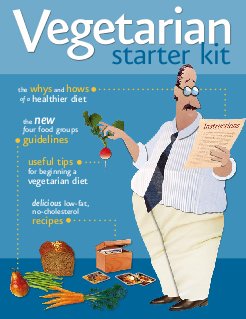 Vegetarian Starter Kit |
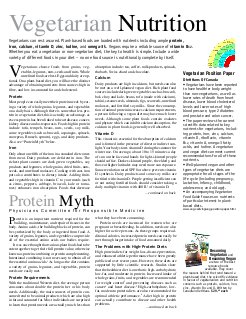 |
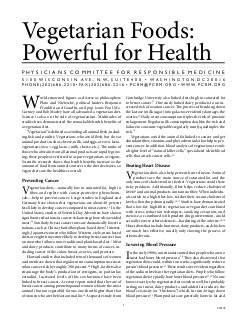
Vegetarian Foods: Powerful for Health |
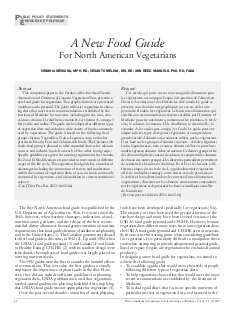
A New Food Guide for North American Vegetarians |
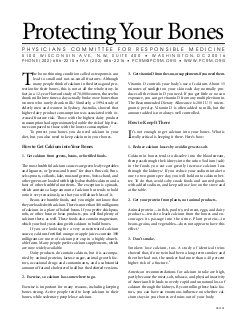
Protecting Your Bones |
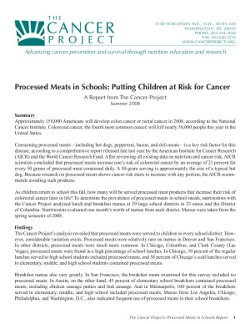
The Cancer Project: Processed Meat in Schools |
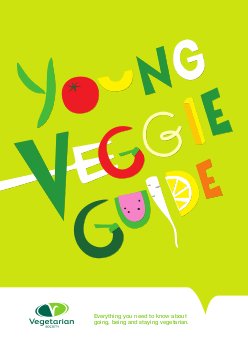
Young Veggie Guide |
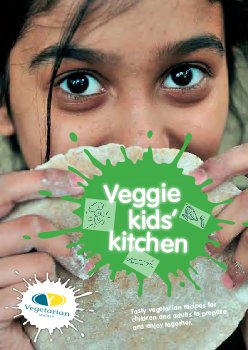 Veggie Kids' Kitchen |
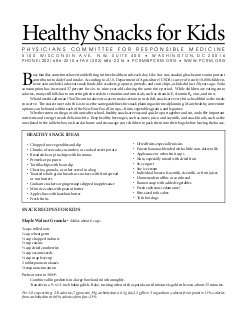 Healthy Snacks for Kids |
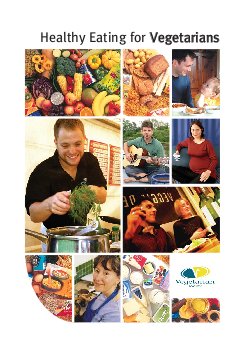 Healthy Eating Booklet |
 Project Book for Schools |
It is the position of the American Dietetic Association that appropriately planned vegetarian diets, including total vegetarian or vegan diets, are healthful, nutritionally adequate, and may provide health benefits in the prevention and treatment of certain diseases. Well-planned vegetarian diets are appropriate for individuals during all stages of the life cycle, including pregnancy, lactation, infancy, childhood, and adolescence, and for athletes. A vegetarian diet is defined as one that does not include meat (including fowl) or seafood, or products containing those foods.... The results of an evidence-based review showed that a vegetarian diet is associated with a lower risk of death from ischemic heart disease. Vegetarians also appear to have lower low-density lipoprotein cholesterol levels, lower blood pressure, and lower rates of hypertension and type 2 diabetes than nonvegetarians. Furthermore, vegetarians tend to have a lower body mass index and lower overall cancer rates. Features of a vegetarian diet that may reduce risk of chronic disease include lower intakes of saturated fat and cholesterol and higher intakes of fruits, vegetables, whole grains, nuts, soy products, fiber, and phytochemicals.
Source: Position of the American Dietetic Association: vegetarian diets
Recommended sites with thorough Nutrition Research:

- VeganHealth.org
- Vegetarian Resource Group: Nutrition Pages
- Vegetarian Diets: a Dietitian's Guide (Ginny Messina, MPH, RD)
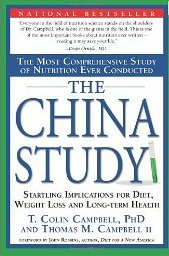
The China Study
This research project culminated in a 20-year partnership of Cornell University, Oxford University, and the Chinese Academy of Preventive Medicine, a survey of diseases and lifestyle factors in rural China and Taiwan. More commonly known as the China Study, “this project eventually produced more than 8000 statistically significant associations between various dietary factors and disease.” Drawing on the project findings in rural China, but going far beyond those findings, The China Study details the connection between nutrition and heart disease, diabetes and cancer. The New York Times has recognized the study (China-Oxford-Cornell Diet and Health Project) as the “Grand Prix of epidemiology” and the “most comprehensive large study ever undertaken of the relationship between diet and the risk of developing disease.” To find out more about the China Study, visit the web site or click on the book at right.
What About Protein?
(The Huffington Post: May 25, 2010) The numbers are startling. Americans consume an astonishing amount of protein. USDA statistics reveal that U.S. men eat as much as 190% of their recommended daily protein allowance, while women eat as much as 160%, the great majority of which comes from saturated-fat heavy meat and meat products.
Protein is essential to life; it builds and maintains muscles, bones and skin, and regulates metabolism and digestion. But the question remains, whether you look at it from the perspective of personal health, or environmental degradation, or cost savings, or animal rights, or veggie activism, or whatever else floats your boat: do we really need to eat all that meat?
I went to the top, to the nation's most influential nutritionist, Dr. Marion Nestle, professor in the Department of Nutrition, Food Studies, and Public Health at New York University, to get her take. “All proteins are made up of the same amino acids. ALL. No exceptions,” she reasons. “The difference between animal and vegetable proteins is in the content of certain amino acids. If vegetable proteins are mixed, the differences get made up. Even if they aren't mixed, all you need to do to get the right amount of low amino acids is to eat more of that food. There is no 'need' for animal proteins at all.”
So, when it comes to protein...if we don't need animal protein all the time, what other options do we have? It turns out that beans, legumes, whole grains, greens, nuts and seeds are excellent sources of protein -- plus they offer the added benefit of fiber (not found in meat), vitamins and minerals. Here's some examples of protein found in readily available foods:
- Broccoli -- 4 grams in 1 cup
- Brown Rice -- 5 grams in 1 cup
- Refried beans -- 7 grams in 1/2 cup
- Soymilk -- 7 grams in 1 cup
- Peas -- 8 grams in 1 cup
- Tofu -- 11 grams in 5 oz
- Oat Bran -- 16 grams in 1 cup
- Lentils -- 18 grams in 1 cup
- Chickpeas -- 18 grams in 1 cup
The key factor, though, is what comes along with the protein. According to the Harvard School of Public Health, a 6-ounce broiled porterhouse steak is an excellent source of protein -- 38 grams worth. But along for the ride are 44 grams of fat, 16 of them saturated! That's almost three-fourths of the recommended daily intake for saturated fat. The same amount of salmon gives you 34 grams of protein and 18 grams of fat, 4 of them saturated. A cup of cooked lentils has 18 grams of protein, but under 1 gram of fat!
That pretty much tells the story right there. It's what comes along for the ride that we need to play closer attention to. Indeed, if Americans are consuming nearly double their protein need, primarily from meat and meat products with their concomitant high saturated fat levels (not to even get into the hormone-administered meat topic, saved for another post), you can see why the nation is staring down the barrel of an obesity epidemic.
Let me leave you with a few low-fat food combos, followed by some interesting recipes from the Meatless Monday movement, where the idea is to cut back on meat consumption by 15% to limit saturated fat intake and to start the week off right -- and light!
- Hummus and pita
- Rice and beans
- Almost any legume-whole grain pair
- Trail mix
- Low-fat yogurt with granola
- Peanut butter on whole wheat bread or rice cakes
- Lentil soup and a roll
- Vegetarian chili with corn bread
- Tofu-vegetable stir fry over rice or pasta
Preventing Cancer:
Vegetarian diets—naturally low in saturated fat, high in fiber, and replete with cancer-protective phytochemicals—help to prevent cancer. Large studies in England and Germany have shown that vegetarians are about 40 percent less likely to develop cancer compared to meat-eaters. In the United States, studies of Seventh-Day Adventists have shown significant reductions in cancer risk among those who avoided meat. Similarly, breast cancer rates are dramatically lower in nations, such as China, that follow plant-based diets. Interestingly, Japanese women who follow Western-style, meat-based diets are eight times more likely to develop breast cancer than women who follow a more traditional plant-based diet. Meat and dairy products contribute to many forms of cancer, including cancer of the colon, breast, ovaries, and prostate.
Read more at PCRM's Cancer Prevention page.
Beating Heart Disease:
Vegetarian diets also help prevent heart disease. Animal products are the main source of saturated fat and the only source of cholesterol in the diet. Vegetarians avoid these risky products. Additionally, fiber helps reduce cholesterol levels and animal products contain no fiber. When individuals switch to a high-fiber, low-fat diet their serum cholesterol levels often drop dramatically. Studies have demonstrated that a low-fat, high-fiber, vegetarian or vegan diet combined with stress reduction techniques, smoking cessation, and exercise, or combined with prudent drug intervention, could actually reverse atherosclerosis (hardening of the arteries).
Read more at PCRM's Cholesterol & Heart Disease page.
The Lifestyle Heart Trial, a 1998 study by Dr. Dean Ornish and associates, published in the JAMA (Journal of the American Medical Association found that "intensive lifestyle changes (10% fat whole foods vegetarian diet, aerobic exercise, stress management training, smoking cessation, group psychosocial support) may lead to regression of coronary atherosclerosis after 1 year... More regression of coronary atherosclerosis occurred after 5 years than after 1 year in the experimental group. In contrast, in the control group, coronary atherosclerosis continued to progress and more than twice as many cardiac events occurred."
See also the MeatlessMondays.com Nutrition FAQ
Preventing & Reversing Diabetes:
Non-insulin-dependent (adult-onset) diabetes can be better controlled and sometimes even eliminated through a low-fat, vegetarian diet along with regular exercise. Such a diet, low in fat and high in fiber and complex carbohydrates, allows insulin to work more effectively. The diabetic person can more easily regulate glucose levels.
Read more at PCRM's Diet & Diabetes page.
Osteoporosis:
While patients tend to assume that boosting their calcium intake will ensure strong bones, research clearly shows that calcium intake is only part of the issue and that simply increasing calcium intake is an inadequate strategy. No less important is reducing calcium losses. The loss of bone mineral probably results from a combination of genetics and dietary and lifestyle factors, particularly the intake of animal protein, salt, and possibly caffeine, along with tobacco use, physical inactivity, and lack of sun exposure. Animal protein tends to leach calcium from the bones, leading to its excretion in the urine. Animal proteins are high in sulfur-containing amino acids, especially cystine and methionine. Sulfur is converted to sulfate, which tends to acidify the blood. During the process of neutralizing this acid, bone dissolves into the bloodstream and filters through the kidneys into the urine. Meats and eggs contain two to five times more of these sulfur-containing amino acids than are found in plant foods...
Read more at PCRM's Preventing & Reversing Osteoporosis page.
In The China Study, Professor T. Colin Campbell wrote the following:
“Americans consume more cow's milk and its products per person than most populations in the world. So Americans should have wonderfully strong bones, right? Unfortunately not. A recent study showed that American women aged fifty and older have one of the highest rates of hip fractures in the world. The only countries with higher rates are in Europe and in the south Pacific (Australia and New Zealand) where they consume even more milk than the United States.”
Why would that be, given that dairy milk really does have the high levels of calcium that the NMPF (the National Milk Producers Federation) attributes to it? Campbell explains:
“[A]nimal protein, unlike plant protein, increases the acid load in the body. An increased acid load means that our blood and tissues become more acidic. The body does not like this acidic environment and begins to fight it. In order to neutralize the acid, the body uses calcium, which acts as a very effective base. This calcium, however, must come from somewhere. It ends up being pulled from the bones, and the calcium loss weakens them, putting them at greater risk for fracture.”
Dairy milk, as the NMPF suggests, contains a large amount of protein, and the protein is – obviously – animal protein. This may account for the link that Campbell discusses between dairy consumption and diseases like osteoporosis that reflect a bone-calcium deficiency. Some calcium-rich plant-based foods are collard greens, almonds, tofu, chickpeas, tahini (sesame seeds), dried figs, and black-strap molasses.
Accordingly, one need not rely on “milk” of any sort to get calcium. In his book, Eat To Live, Dr. Joel Fuhrman, a widely-published medical doctor and nutrition specialist, explains that "[g]reen vegetables, beans, tofu, sesame seeds, and even oranges contain lots of usable calcium, without the problems associated with dairy.”
Sherry F. Colb, Professor of Law and Charles Evans Hughes Scholar at Cornell Law School: Source

HEALTH LINKS:

 EarthSave Canada
EarthSave Canada- Vegetarian Society UK - www.vegsoc.org
- Young Veggie.org - www.youngveggie.org
- Vegetarian Diet Info - www.vegetarian-diet.info/
- Virginia Messina, Registered Dietitian

Back to TOP OF PAGE
May 24, 2010
Seattle [vegan] runner breaks American 24-hour record
Scott Jurek, a Seattle physical therapist and ultramarathoner, broke the American record in the IAU 24-Hour
World Championship run Friday in Brive, France, by covering 165.7 miles in the one-day run.
Read more at Seattle Sports Blog and Scott's web site.
“Nothing will benefit human health and increase the chances for survival of life on Earth as much as the evolution to a vegetarian diet.”
— Albert Einstein

Sir Paul McCartney sums it all up: "If anyone wants to save the planet, all they have to do is just stop eating meat. That's the single most important thing you could do. It's staggering when you think about it. Vegetarianism takes care of so many things in one shot: ecology, famine, cruelty."